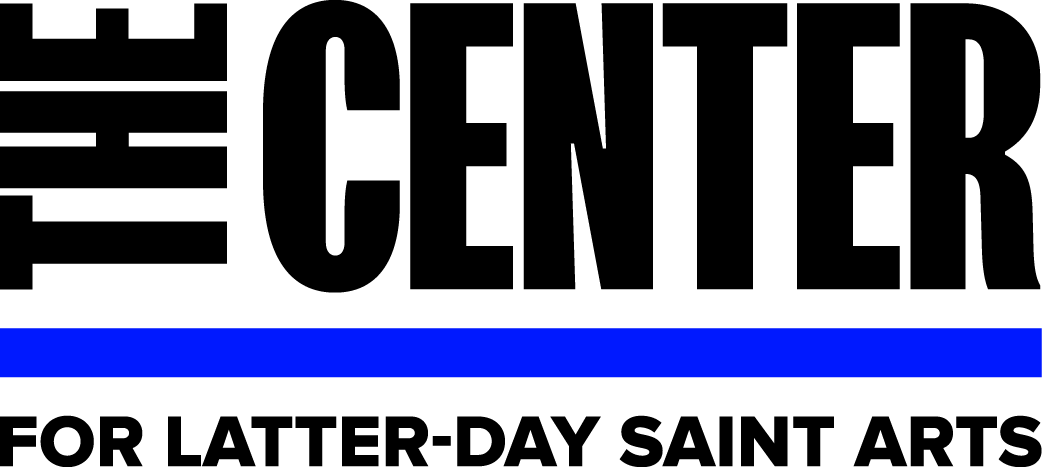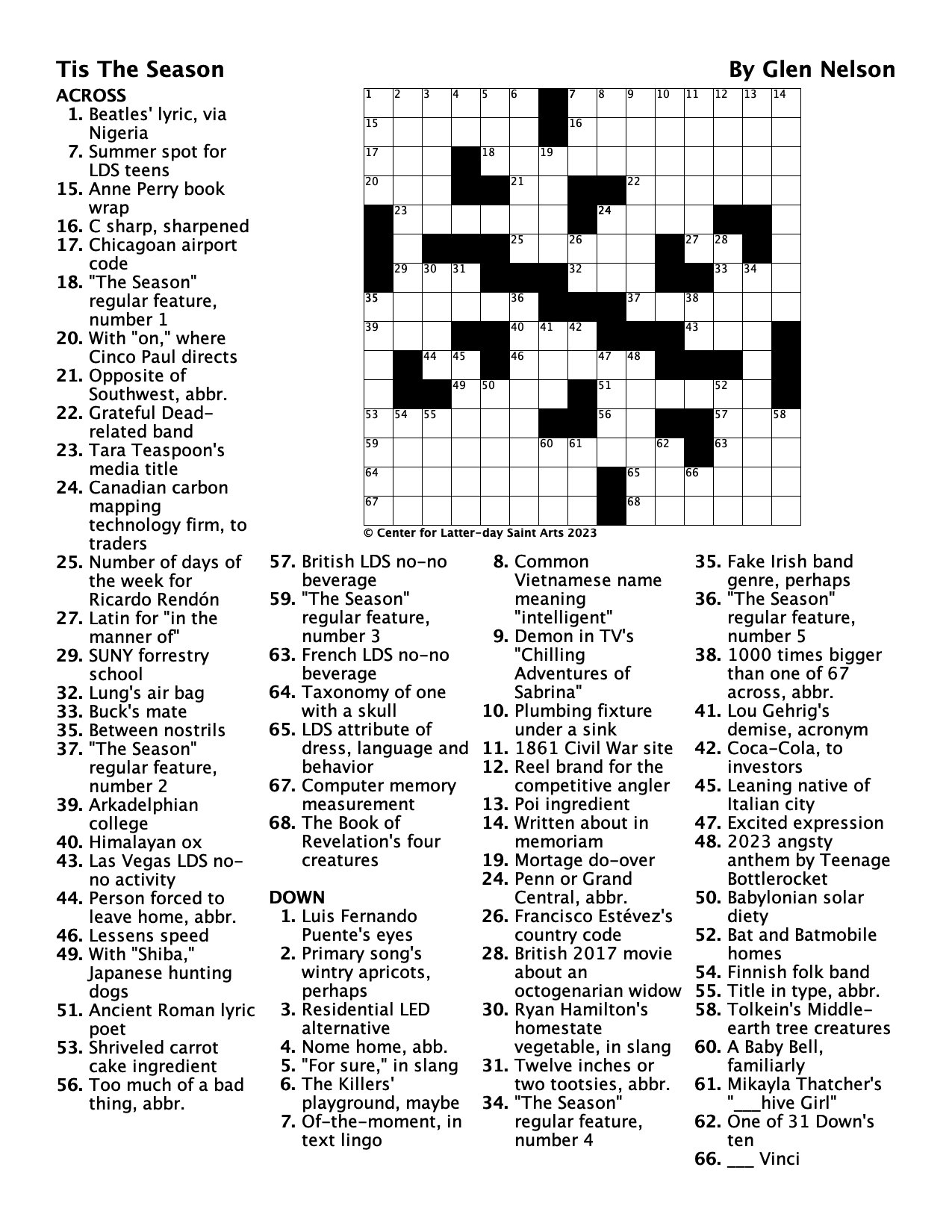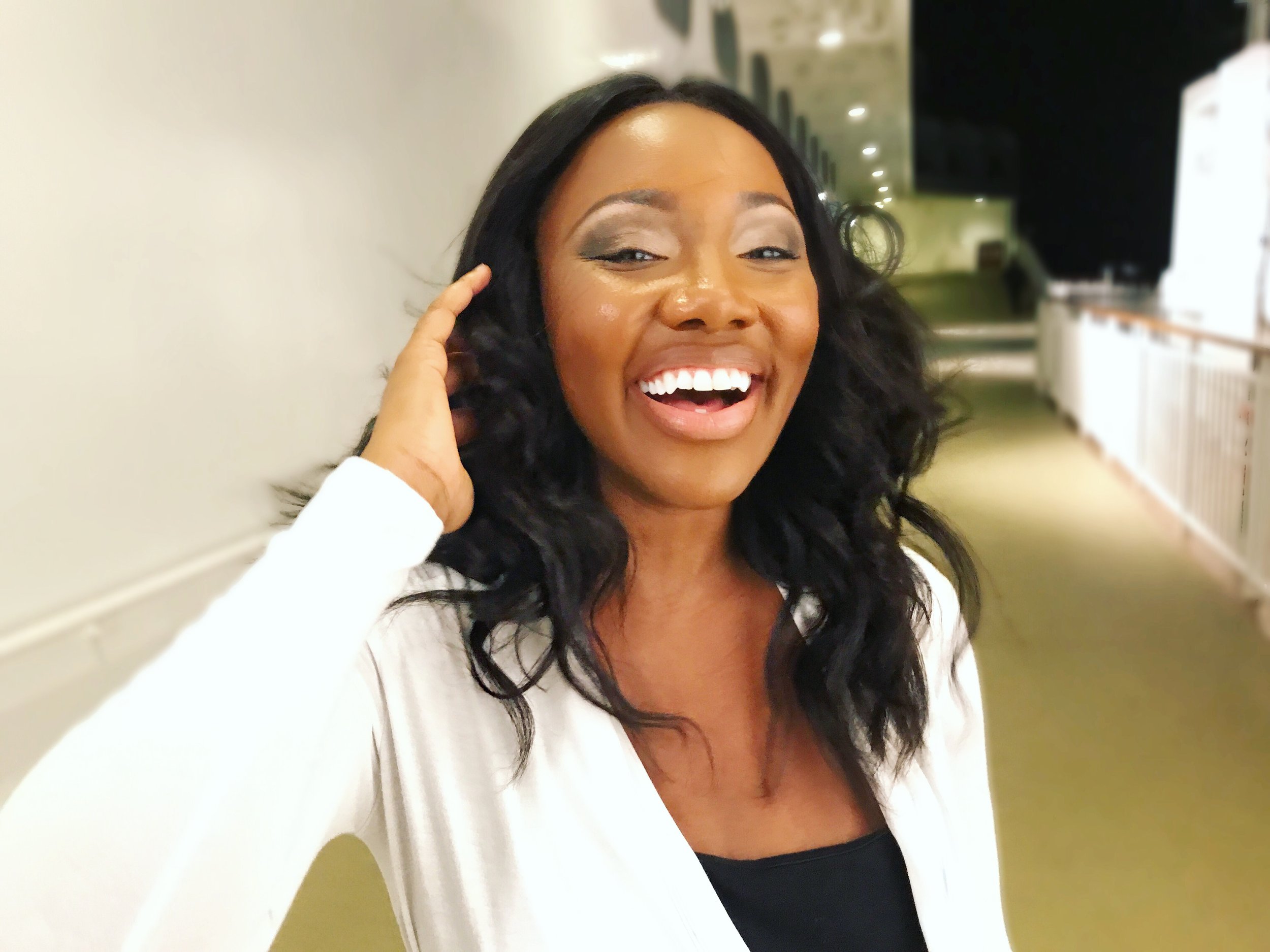↓
In Much Ado About Nothing this advice appears: “It is needful that you frame the season of your own harvest.” Shakespeare did not have The Season in mind, but the Bard’s counsel to determine one’s own cycle in life makes us jump into gratitude mode. In this final issue of The Season, we look back to frame this project of the Center for Latter-day Saint Arts with appreciation–for our readers, for the artists whose works we have profiled and followed, and for the people who made the endeavor possible. The works in this issue are newly-commissioned offerings in the form of essays, articles, visual artworks, film, music, and dance–all from the publication’s editorial board. Finally, we leave you with some advice of our own, from the book of James: “And a harvest of righteousness is sown in peace by those who make peace.” (James 3:18, English Standard Version)
What Just Happened
The Story Teller
Search for Atabei
Embracing the Weird: A New Moment for Latter-day Saint Art
Life Itself
Tis The Season
Timeless Fruit
Mormon Literature in Spanish: Current Developments and Outlook
Detroit Underground
Living Waters
Will There Be a Season 2?
Artivism and Christianity
First, a letter not to the editor but from him. I want to thank the many people who have expressed reactions, insight, and clarifications to the articles of The Season. My favorite letters to the editor came from people who shared their own lives and opinions with us. I believe we are lifted up by each other’s stories, and we learn wisdom from each other’s lives. Albert Einstein said, “The only source of knowledge is experience,” but I think that can include vicarious learning. Again, our thanks and my thanks.
Glen Nelson, editor in chief
New York, New York
In response to “Fire Is a Chain Reaction” by Bridget Verhaaren in the August issue, readers responded with gratitude to the author and with their own related stories.
ed.
I really liked this–I was in a class on intersectionality this week–and I came to a deep realization of my own sense of vulnerability and work around protecting pieces of my identity (specifically religious identity) because of stereotyping and bias I encountered.
Leslie Whyte Graff
Sutton, Massachusetts
This is a thought-provoking piece. I think most people are probably carrying around a lot of hurtful experiences and are trying to fly low under the radar and blend in. How beautiful and courageous it is to both dare to be different and treat others’ differences with love, respect, and acceptance.
Tatiana Bryan Christensen
Alpine, Utah
When I was in grad school, a visiting professor from Yale--not Harold Bloom; I couldn't pull strings to get into his seminars--absolutely demolished a student who raised a question about religious belief. Even her comment that an author might be of faith set this teacher off. It was a tirade that I can't forget. I would like to think that such a one-sided screaming match would get someone like him fired today, but the stories I'm hearing suggest otherwise. Did I think twice about professing devotion in classes after that? I'm embarrassed to confess: yes, absolutely, I did.
Glen Nelson
New York, New York
When I was in grad school at NYU back in the 80s, I was fortunate to have been preceded by a number of BYU grads, so being LDS wasn't really a novelty. It did set me apart, though, and I still cringe remembering the time's I'd hear a group of fellow students having what appeared to be a fun conversation, but sensing my presence quickly changing to topic. Occasionally I'd be asked questions such as, "What's going on in Salt Lake City?" in response to the Mark Hoffman bombings.
One of the professors, Jan LaRue, told me once his wife had been born in Salt Lake City, but when she was about five years old, her family moved to the east coast, leaving Utah (and the church) behind. She still kept in touch with the Utah branch of the family, and the LaRue's visiting Utah a number of times. One time Prof. LaRue told me, "You know, you Mormons are good people. But some of you have a tendency to primp and preen about your goodness. I feel like I can say that to you, because you're not like that . . ." (Thankfully!) But I'll never forget the day, after I'd done a bit of extra work for him in my assistantship, he brought me a bag from a local bakery. "I want you to share this with you wife - it has a flavor you might not be familiar with." Indeed, the rum flavored cream filling was delicious!
Of course, I remembered the bulletin board posting of an available job at BYU - and one of the students muttering, "How could anyone ever want to go there?" (It was interesting that the professor who wrote that letter that in all likelihood got me admitted to NYU wasn't LDS . . .)
I don't think I ever shied away from my "Mormonness," nor did I wear it on my shirt sleeve - and I made some great friends there.
One thing I should note - being only one of a number of LDS students in that program, they were actually quite accommodating. They would often have guest lectures with a cheese and wine spread afterward. They's started included sparkling cider or something similar to be inclusive. The funny thing is, those options were already consumed by the time I got to the table!
One more incident…I was invited to a birthday party, and one of the attendees struck up a conversation. This guy wasn't a student, but he participated in an early music performance group. Once he learned I was from BYU, the questions started: "You're still not a believer, are you? I mean, you're in grad school . . . . " I was feeling very uncomfortable, being the rather inhibited person that I am. And then he asked, "What makes Mormons truly unique?" I wanted to keep it simple (and get this conversation over with!), and the urge hit me–give him the well-known Lorenzo Snow couplet: "As man is, God once was; as God is, man may become." As soon as I said it, I thought to myself, "No - I didn't . . . "
But the response this guy gave me, after a bit, was, "Wow. I had no idea . . . I think that's what people used to believe until Christianity messed it all up. I don't think I'll ever make fun of Mormons again - thanks." You just never know.
D. Kim Croft
Everett, Washington
It's only in connection with the recent performance of my Oratorio CHRISTUS and a 2019 workshop presentation of my chamber opera Ammon and the King that my religious beliefs have ever come up in my grad school, my advocacy for living composers, especially women, and my performing career. I just never mentioned it. Like my musical partner's homosexuality, my religion never came up because we were completely focused on making music!
Deon Nielsen Price
Arroyo Grande, California
I had so many similar experiences as a grad student researching gender at Oxford in the 90s. Everyone assumed I had left the LDS church and was angry, which was hardly the case. This is a fantastic article.
Raquel Cook
American Fork, Utah
I got some fire from one professor in my doctorate degree. But, as I found, normal people don't care about the differences between people, it's usually narcissists that create boundaries that don't exist.
Robert Anton Strobel
Elizabeth, Colorado
Amazing! I really needed to read that this morning. Days never to be forgotten with similar experiences in grad school at Columbia and in the NY architecture scene afterwards, both mockers, graceful defenders, and lifelong friends who've wanted to learn more.
Tim Boyle
Mesa, Arizona
This is almost a daily event for me in my professional life, thanks to The Book of Mormon Musical, which everyone thinks is hilarious. Every fall the new crop of sophomores will make rude comments or really bad jokes about Mormons and I’ll say, “Thank you for that. I’m a Mormon.” Last summer my co-teacher was headed off to the Utah Shakespearean Festival, and when he told the students, they invariably commented, things like, “Watch out, you’re going to be with those Mormons.” Or, “How can you stand to work in the middle of those Mormons?” To which he replied, “You’ve been working with a Mormon all year and she’s amazing,” and he pointed to me, and the students were absolutely flabbergasted. One student actually said to me, “But I thought you were so smart…” I never take offense. It’s not that big of a deal. But it can be exhausting.
Charis Bean Duke
Philadelphia, Pennsylvania
I love this article! Over the past 30 plus years living coast to coast and in between, I have loved the people and friends I have made. I am a better person for knowing so many of them and grateful for my experiences. But there is definitely a naivety and lack of understanding regarding my religion–which often comes with intolerance and mockery. I've done my best to dispel the negative stereotypes or ideas–probably with limited success. And while I am only a patron in the art world, I felt a familiarity with this piece of writing. Enjoy the read–it is worth wading into it!
Amy Hawkins Wilcox
St. Louis, Missouri
This was a fantastic article! Thank you Bridget for sharing your story and for your unwavering commitment to your Faith. I totally feel inspired and truly grateful!
Andrew Lloyd
San Antonio, Texas
The DEI office at my university didn’t know what to do with me a few months ago when I submitted a complaint for a guest lecturer who claimed “religious belief is stupid but people still do it”…in a theology seminar. They’re willing but totally unprepared. To be fair, it was cross-listed with theology and musicology, and musicologists had made the invitation. It stood out to me because it was a passing comment on the way to a different point about her topic-- just her side example of how we can't always expect historical figures to be rational actors. It was a Zoom seminar and so I couldn't gauge how it fell "in the room" but there were multiple practicing religionists in the room.
Ruth Eldredge Thomas
Baltimore, Maryland
As Bridget mentions in her essay “Fire is a Chemical Reaction,” we first met in December 2019 at Vermont College of Fine Arts winter residency. We were in the same cohort, and the same writing workshop. During the workshop, Bridget asked an innocent question, "Do other religions use the term Heavenly Father?" She didn't know it at the time, but she helped to plant a tiny seed. I had been struggling with severe mental health illnesses. I was struggling with survivor's guilt that comes from seeing terrible things in the military. And I had just been discharged from a long-term psychiatric care facility only six months prior to meeting Bridget at VCFA. I wasn't ready to hear the entire truth at the time, but Bridget mentioning the phrase Heavenly Father gave me a feeling of peace and comfort, which allowed me to ask her a number of faith based questions over the next couple of years.
Fast forward to February 2023, my wife Kate began studying with LDS sister missionaries. I was invited to a Book of Mormon study where we covered 3 Nephi 11: 1-17. Seeing that the Nephites not only saw Christ, but got to have a personal relationship with him was incredibly comforting. I too longed for that type of relationship. So I began to study. March 25, 2023 my wife, my daughter and I were baptized. April 9, 2023 I received the Aaronic Priesthood. April 15, 2023 we went to the temple in Palmyra for the first time and performed baptism ordinances. A feeling of comfort and joy filled me unlike any I had ever felt before. May 21, 2023 I received my patriarchal blessing and also received the Melchizedek Priesthood. On June 3, I had the honor and privilege to baptize and confirm my son WIlliam who has autism. I have seen many miracles in the past few months, and I am so thankful that I have the gift of Christ's atonement, and the restored gospel. I am thankful for a living prophet, and I am thankful for Bridget for helping to plant the seed four years ago, even if she didn't know she was doing it at the time. Heavenly Father placed Bridget and I in the same writing workshop for a reason.
Robert T. Atwood
Rome, New York
It's interesting to see how different people react to Latter-day Saints. In 1982 I began a two-year experience as a writer/producer at NBC in Burbank, CA. After a few weeks I was talking to a Senior VP at the network who was going to spend Christmas hoildays in England. He invited me to bring my family down from Utah and spend the holidays house-sitting for him at his mansion in the Hollywood Hills. Amazed, I asked "Steve, you're willing to turn over your home to someone you've only known for a few weeks?" He said, "Well you're a Mormon, aren't you?" I've never been so proud to be a "Mormon".
Robert Starling
Riverton, Utah
Dear Bridget: I know very well the feelings you had when you heard your fellow students in Vermont mock Mormons. As a lifelong academic I have been similarly belittled more than once. You came up with just the right response: admission of your faith mixed with a little humor. A lovely essay all around.
Thanks for sending your essay to The Season. You probably have heard that it received more responses than anything we have published.
Richard L. Bushman
New York, New York
Following my final M.F.A. residency, I stopped in Sharon, Vermont, the birthplace of the prophet Joseph Smith, and walked the grounds. I wondered, “How much have attitudes toward the L.D.S. religion changed in almost 200 years?”
I’m awed by the responses I’ve received from readers of my essay, ““Fire Is a Chain Reaction.” Emails from members of my cohort acknowledged the wrongful presence of prejudice and blatant bigotry.
I’m inspired by the daring courage and humor utilized to confront intolerance. And I’m reminded that we each possess a gradual ripple effect of influence – “Godly Love” that can withstand discrimination.
Bridget Verhaaren
American Fork, Utah
Ted Bushman
Ted Bushman is a composer and writer currently based in the Hudson Valley. He is a member of the BMI Lehman Engel Musical Theatre Workshop, and his fiction has been published in Beneath Ceaseless Skies, Metaphorosis, and Inscape.
Kathie Debenham
Kathie Debenham is Emeritus Professor of Dance at UVU where she founded the Dance Department and was inaugural Dean of the School of the Arts. She is a member of the Center for Latter-day Saint Arts’ Advisory Board and The Season Editorial Board.
Megan Eckersley
Megan Eckersley is a graphic designer based out of New York City and has worked with clients like Squarespace. She is currently at Square as a Brand Designer.
Gabriel González
Gabriel González is a native of Uruguay who has also lived in Belgium, Ecuador, and the United States. In addition, he has spent several months in Colombia, Germany, Mexico, and Spain.
Glen Nelson
Glen Nelson is an author, arts executive, exhibition curator, librettist, and scholar. Co-founder of the Center for Latter-day Saint Arts, his most recent publication is the studio recording of an oratorio by himself and Ethan Wickman, To a Village Called Emmaus, conducted by Craig Jessop leading the American Festival Chorus and Orchestra.
Jeff Parkin
Jeff Parkin is an award-winning filmmaker and film professor at Brigham Young University. He and his wife, artist Jana Parkin, live in Provo, Utah.
Kristin Perkins
Kristin Perkins is a Ph.D. student at Columbia University, conducting research at the intersection of queer theory, religion, and performance. She has been published in Theatre Topics, Ecumenica, SFRA Review, American Theatre Magazine, and Howlround.
Arisael Rivera
Arisael Rivera is an actor, playwright, and poet based in The Bronx, New York. Most recently, his poem "Jubilant Feet" was published in the anthology Love Letters to Gaia by Miro C.
Madeline Rupard
Madeline Rupard received an MFA in Painting from Pratt Institute. Her recent paintings of the American West appeared in this years’ New American Paintings Juried-In-Print Exhibition, Issue #156.
Joël René Scoville
Joël René Scoville is an actress, writer, and lyricist. Her work includes musicals, an upcoming comic book, and her web series, Crazy with a K! She is a member of the prestigious BMI Lehman Engel Musical Theatre Workshop as both a librettist and lyricist. She lives in Spanish Harlem, NY with her husband and they have three sons.
Benjamin Dean Taylor
Benjamin Dean Taylor is a composer of contemporary concert music. He has received professional commissions from individuals and ensembles all over the world and is one of the few living composers today making his primary income from writing and self-publishing his music.
Mykal Urbina
Mykal Urbina is the Executive Director of the Center for Latter-day Saint Arts. Arizona-raised, New York-educated, Orange County transplant, current Salt Lake City resident, Mykal previously worked for the New York Philharmonic at Lincoln Center and Segerstrom Center for the Arts.
Kwani Povi Winder
Kwani Povi Winder is an oil painter based in Utah and an enrolled member of the Santa Clara Pueblo. She's an inspired mother, pianist, hiker, camper, who loves reading, painting and living life.


















